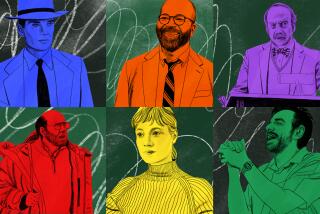Medical Schools Do Teach Humanity
- Share via
Even a movie “based on a true story” can take some liberties with the facts to create compelling drama. “Don’t let the facts get in the way of a good story” is a well-known adage. But the desire should still be to convey truth, not a false and misleading picture of reality. In the movie “Patch Adams,” the stern-faced dean lectures to first-year medical students, “It’s our mission here to rigorously and ruthlessly train the humanity out of you.” This crosses the line between exaggeration that illuminates and distortion that misinforms.
In order to contrast the compassionate and funny student played by Robin Williams with the pompous and dour Dean Wolcott, the film puts words in the mouth of the dean that are inconceivable. As reviewer Jack Mathews observed, the movie “is built on the assumption that administrators are fed ice water intravenously.” (“Med Student ‘Patch Adams’ Laughs in the Face of Illness,” Calendar, Dec. 25.)
Can you imagine a law school dean telling a first-year class, “It’s our job to train honesty out of you?” How about a journalism school dean saying, “Our goal is to teach you to pretend objectivity while advocating a cause?” Some graduates may end up doing these things, but they are certainly not ideals any reputable educational institution promotes.
I went to medical school around the same time as the real Patch Adams, but found very different attitudes in medicine than those portrayed in the movie. Rather than “train the humanity out” of students, a principal goal of medical education was to maintain humanity and compassion in the midst of difficult, stressful and exhausting situations.
In the course of his practice, a doctor comes across horrible as well as marvelous people. He treats wonderful people who are behaving boorishly under the stress of their illness. He meets patients who are afraid, in pain and not at their best. In medical school and residency, doctors receive training to help them treat all these people with compassion and respect.
*
In my school, we held small group seminars in improving our communication with patients. We read books and articles on the subject. Experienced clinicians both modeled and instructed us in ways of comforting people under our care.
Of course, not all doctors live up to the highest ideals of the profession in each of their patient interactions. Many obviously fall far short. But to portray the cold, uncompassionate doctor as the goal of medical education rather than as a failure of medicine is to stand reality on its head.
Dean Wolcott tells Patch, “What you want is for us to get down on the same level as our patients.” While medical knowledge and the power that comes with it may lead to elitism, it is an undesirable byproduct and certainly not advocated in medical schools.
Patch Adams clowns more than most doctors, but there are many paths to being a good physician. The movie does ultimately show that he graduates from medical school and establishes a practice compatible with his ideals and personality. His story is inspiring and worth watching.
The movie succeeds in showcasing a wonderful, if somewhat offbeat physician. It fails when it turns preachy, advocating the obvious, acting as if the idea that humanity is desirable in physicians is something new and revolutionary. Quite to the contrary, being compassionate to our fellow human beings is a most basic and time-honored tradition in medicine.
Andrew G. Kadar is a physician practicing in Los Angeles and a freelance writer.
More to Read
Only good movies
Get the Indie Focus newsletter, Mark Olsen's weekly guide to the world of cinema.
You may occasionally receive promotional content from the Los Angeles Times.








